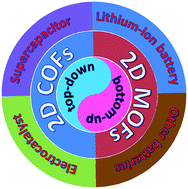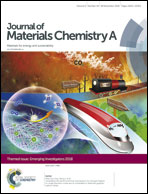Recent progress in two-dimensional polymers for energy storage and conversion: design, synthesis, and applications
Abstract
The increasing concerns about environmental issues caused by fossil fuels, and the demand for renewable energy have trigged extensive research into efficient energy storage and conversion systems. Owning to their unique properties of a high specific area, well-defined pore size, and tunable molecular structure, 2D metal–organic frameworks (MOFs) and covalent–organic frameworks (COFs), as two typical classes of 2D porous polymers, have been considered as intriguing materials for energy storage and conversion. This review provides a comprehensive overview of the up-to-date synthesis strategies of 2D MOFs and COFs, and their further applications. We mainly focus on the top-down and bottom-up synthesis methods, and applications in supercapacitors, lithium-ion batteries, batteries beyond lithium-ion batteries (lithium–sulfur batteries, and sodium-ion batteries), and electrocatalysts for CO2 reduction, oxygen evolution, oxygen reduction, and hydrogen evolution.

- This article is part of the themed collections: Recent Review Articles and Journal of Materials Chemistry A Emerging Investigators


 Please wait while we load your content...
Please wait while we load your content...